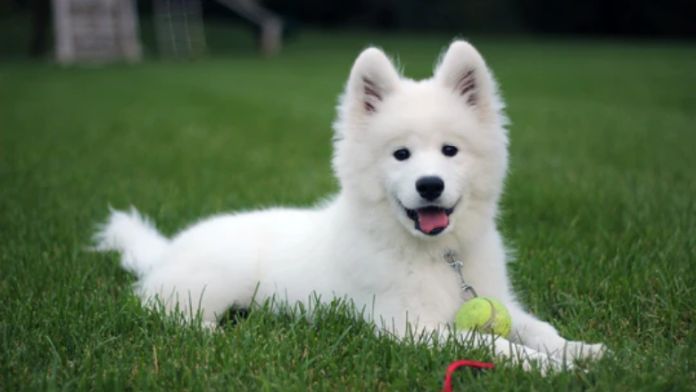
Are you on the hunt for a furry companion that won’t leave you sniffling and sneezing? Look no further than the world of hypoallergenic puppies! Not only do these adorable pups make for great pets, but they’re also a fantastic choice for anyone with allergies.
But with so many breeds, how do you choose the perfect one? That’s where we come in! In this article, we’re going to introduce you to 12 of the cutest small hypoallergenic puppies that are sure to steal your heart. From the playful Maltese to the regal Poodle, we’ve got all the breeds you need to know about.
But before we dive into the specifics, let’s talk more about what it means to be hypoallergenic. Contrary to popular belief, no dog breed is completely allergen-free. However, hypoallergenic breeds produce fewer allergens than other breeds, making them a better choice for people with allergies.
Now that we’ve cleared that up let’s begin our journey through the wonderful world of small, hypoallergenic puppies. Get ready for some serious cuteness overload, folks!
Maltese
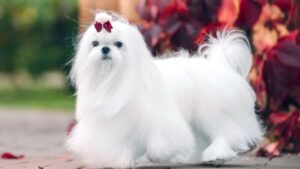
The Maltese are a beloved breed known for their luxurious coat, small size, and charming personality. These little dogs are incredibly loyal and make excellent companions for individuals and families.
The Maltese breed originated in the central Mediterranean region, with the first records dating back to ancient Greece. These dogs were prized for their beauty and used as lap dogs and companions for the wealthy. The Maltese eventually made their way to Europe, becoming a popular choice among royalty and aristocracy. Maltese is still a popular breed worldwide and is recognized by the American Kennel Club.
One of the most notable characteristics of the Maltese is their long, silky white coat. This requires regular grooming to prevent matting and tangling, but it’s well worth the effort for the striking appearance. In addition to their beautiful coat, Maltese are known for their sweet, affectionate personality. They love nothing more than cuddling up with their humans and are always up for a good snuggle session.
Maltese are also known for being intelligent and trainable, making them a great choice for first-time dog owners. They respond well to positive reinforcement training methods and are eager to please their humans. It’s important to note that Maltese can be prone to separation anxiety if left alone for long periods. They thrive on human companionship and do best in households where someone is around most of the time.
When it comes to health, Maltese are generally a healthy breed. However, they can be prone to certain genetic health conditions, such as patellar luxation, dental problems, and eye issues. Regular vet checkups and preventative care can help keep your Maltese healthy and happy.
Yorkshire Terrier
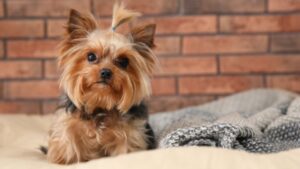
These small, hypoallergenic pups are known for their spunky personalities and luxurious coats. Originally bred in England as a rat-catching dogs, Yorkies have become popular with apartment dwellers and families. Here’s what you need to know about these charming little dogs:
Description of the Breed
Yorkshire Terriers, or Yorkies for short, are a small breed typically weighing between 4 and 7 pounds. They have long, silky coats in shades of black and tan or blue and tan. Their small size makes them a popular choice for people who live in apartments or smaller homes, as they only require a little space to exercise.
Temperament and Personality
Despite their small size, Yorkies are big on personality. They are known for being confident, bold, and affectionate. They love attention and are happiest when they are beside their owner. However, Yorkies can be stubborn and independent, so early training and socialization are key to preventing behaviour problems.
Grooming and Exercise Needs
Yorkies have long, luxurious coats requiring regular grooming to prevent matting and tangles. Daily brushing is recommended, as well as regular baths and haircuts. Yorkies also benefit from daily exercise but only require a little space. A short walk or a game of fetch in the backyard is usually sufficient to keep them happy and healthy.
Training Tips
Because of their independent nature, Yorkies are more challenging to train than other breeds. However, with patience and consistency, they can learn a variety of commands and tricks. Positive reinforcement methods, such as treats and praise, work best with Yorkies.
Health Concerns
Like all breeds, Yorkies are prone to certain health conditions. They are susceptible to dental problems, so regular teeth cleaning is important. Yorkies can also develop tracheal collapse, which is a condition where the windpipe becomes weak and can cause breathing difficulties. Regular veterinary checkups can help catch these and other health issues early on.
Shih Tzu
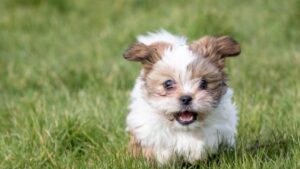
Description of the Breed:
The Shih Tzu is a small dog breed that originated in China, known for its long, flowing hair and playful personality. These pups have an average height of 9-10 inches and a weight of 9-16 pounds, making them the perfect size for snuggling on the couch or accompanying you on a walk. With their adorable faces and luxurious coats, it’s no wonder they’re popular with pet owners.
Temperament and Personality:
Shih Tzus are known for their friendly and affectionate personalities. They love being around people and crave attention from their owners. They are also playful and enjoy running around and playing with toys, making them great pets for families with children. Additionally, they are known to be relatively easy to train and eager to please their owners.
Grooming and Exercise Needs:
One of the defining characteristics of the Shih Tzu breed is their long, flowing hair. While their hair may be beautiful, it also requires regular grooming to keep it looking its best. Daily brushing is necessary to prevent tangles and mats from forming, and many owners choose to take their Shih Tzu to a professional groomer every few months to maintain their coats. Regarding exercise, Shih Tzus are relatively low-energy dogs and do not require a lot of exercises. A short walk or playtime in the backyard should be enough to keep them happy and healthy.
Training Tips:
As previously mentioned, Shih Tzus are generally easy to train and eager to please their owners. However, like all dogs, they require consistent and positive training to ensure that they become well-behaved family members. Positive reinforcement training methods, such as giving treats and praise, work well with Shih Tzus. Additionally, it’s important to socialize with them from a young age to ensure they are comfortable around other people and animals.
Health Concerns:
Like all breeds, Shih Tzus are prone to certain health conditions. The most common health issues include eye problems, hip dysplasia, and allergies. It’s important to choose a reputable breeder and take your Shih Tzu to the vet for regular checkups to ensure they are healthy and happy.
Overall, the Shih Tzu is an adorable and friendly breed that makes a great addition to any family. With their playful personalities and beautiful coats, it’s no wonder they are such a popular choice for pet owners.
Bichon Frise
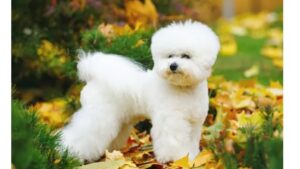
If you’re looking for a small, hypoallergenic pup full of love and affection, look no further than the Bichon Frise. This breed has been a favourite of many for centuries, and it’s easy to see why. With their fluffy white coat and playful demeanour, they are sure to win your heart.
Description of the Breed
The Bichon Frise is a small breed weighing 12-18 pounds and standing about 9-11 inches tall. They have a hypoallergenic white coat that doesn’t shed much, making them an ideal pet for people with allergies. They are known for their dark, round eyes and cute button nose, which gives them a teddy bear-like appearance.
Temperament and Personality
The Bichon Frise is a happy-go-lucky breed that is known for being friendly and affectionate. They are highly sociable and love being around their owners and other pets. They are playful and energetic and love to run around and play fetch. Despite their small size, they have big personalities and are known for being brave and confident.
Grooming and Exercise Needs
The Bichon Frise has a thick, curly coat that requires regular grooming to prevent matting and tangling. They should be brushed at least once a week and bathed every three months. They also need regular trimming to maintain their coat’s shape and prevent it from growing too long. When it comes to exercise, the Bichon Frise needs daily walks or playtime to keep them happy and healthy.
Training Tips
The Bichon Frise is an intelligent breed and is generally easy to train. They respond well to positive reinforcement, and it’s essential to start training them early to prevent any unwanted behaviours from developing. They also thrive on routine and consistency, so keeping their training sessions short and regular is essential.
Health Concerns
Like all breeds, the Bichon Frise is prone to some health issues, including allergies, eye problems, and skin conditions. However, with proper care and regular visits to the vet, most of these health issues can be prevented or managed.
The Bichon Frise is an excellent choice for anyone looking for a small, hypoallergenic pup with a big personality. They are friendly, playful, and easy to train, making them an ideal pet for families with children or seniors looking for a loyal companion. If you’re looking for a dog that will keep you smiling and feel loved daily, then the Bichon Frise is the perfect pup.
Poodle
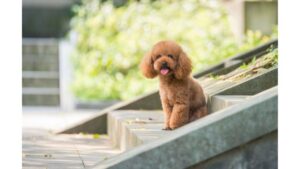
Description of the Breed:
Poodles come in three sizes: toy, miniature, and standard, but for the purpose of this article, we’ll focus on the toy and miniature sizes. These fluffy pups have curly, hypoallergenic coats that require regular grooming to keep them looking their best. Their coats come in various colours, including black, white, apricot, and chocolate.
Temperament and Personality:
Poodles are known for being intelligent, loyal, and affectionate. They love to be around their humans and are great with children, making them excellent family pets. They are also energetic and enjoy daily exercise and playtime. Poodles are quick learners and thrive on positive reinforcement training methods, so keep training sessions fun and engaging.
Grooming and Exercise Needs:
As mentioned earlier, Poodles require regular grooming to keep their coats tangle-free and healthy. Their curly hair doesn’t shed much, which makes them a great choice for people with allergies, but it also means that their hair can mat easily if not brushed regularly. Poodles also require daily exercise to keep them physically and mentally healthy. Daily walks and playtime in a fenced yard are great ways to meet their exercise needs.
Training Tips:
Poodles are smart and eager to please, which makes them relatively easy to train. However, they can be sensitive to harsh training methods, so it’s essential to use positive reinforcement techniques. Start with basic obedience training and gradually increase the difficulty of the tasks as your pup progresses.
Health Concerns:
Like all breeds, Poodles are prone to certain health concerns. Toy and miniature Poodles are susceptible to luxating patellas (kneecaps that slip out of place), while all sizes can be prone to ear infections and dental problems. Regular vet checkups, a healthy diet, and proper grooming can go a long way in preventing these health issues.
Cute Pictures:
And now, what you’ve been waiting for cute pictures of Poodles! Check out these adorable pups in their various haircuts, from the classic “puppy cut” to the fancy “continental cut.”
Overall, Poodles are an excellent choice for anyone looking for a small, hypoallergenic puppy with a fun-loving personality and a great sense of humour. With proper training and grooming, they can make a loyal and loving companion for many years.
Other Small Hypoallergenic Puppies
Ah, the world of small, hypoallergenic puppies! We’ve covered some of the most popular breeds, but what about the lesser-known breeds that still make excellent companions for those with allergies? Let’s take a look at some of the other small hypoallergenic puppies you may want to consider:
Chinese Crested
This breed is known for its unique hairless appearance, although some have a coat of soft fur on their heads, feet, and tails. Chinese Cresteds are affectionate, loyal, and playful and make great lap dogs. Despite their lack of fur, they do need regular grooming, as their skin can be sensitive and prone to irritation.
Havanese
The Havanese is a small, fluffy dog that is known for its friendly and outgoing nature. They have a long, silky coat that doesn’t shed much, making them great for people with allergies. Havanese dogs are intelligent, easy to train, and love being around their owners.
Coton de Tulear
The Coton de Tulear is a small, white dog with a cotton-like coat. They are playful and intelligent and love being around their owners. These dogs are easy to train and make great family pets. Their coat requires regular grooming, but they shed very little, making them great for people with allergies.
Italian Greyhound
The Italian Greyhound is a small, elegant dog known for its sleek and graceful appearance. They have a short coat that doesn’t shed much, making them great for people with allergies. Italian Greyhounds are affectionate and loyal and love to cuddle with their owners.
Basenji
The Basenji is a small, muscular dog known for its unique yodelling sound. They have a short, fine coat that doesn’t shed much, making them great for people with allergies. Basenjis are intelligent and independent, requiring plenty of exercises and mental stimulation.
These are just a few examples of the other small, hypoallergenic puppies out there. Each breed has unique characteristics, so be sure to research and find the one that best fits your lifestyle and personality. No matter which breeds you choose, you’re sure to find a loyal and loving companion that won’t trigger your allergies.
The benefits of owning a hypoallergenic puppy
Not only are small, hypoallergenic puppies cute and cuddly, but they also offer a range of benefits for their owners. If you’re considering adding a furry friend to your family, here are just a few reasons why a hypoallergenic puppy may be the perfect choice for you:
Allergy-Friendly: The most obvious benefit of owning a hypoallergenic puppy is that they’re allergy-friendly. Unlike traditional breeds that shed and produce dander, hypoallergenic puppies have coats that are less likely to cause allergic reactions. This means you can enjoy a furry friend’s love and companionship without worrying about sneezing and itching.
Low Maintenance: Another advantage of owning a hypoallergenic puppy is that they’re low maintenance. Because they don’t shed as much as other breeds, you’ll spend less time cleaning up after them and less money on grooming appointments. This can be especially beneficial for busy individuals or families with young children.
Great for Small Spaces: A hypoallergenic puppy can be a great option if you live in an apartment or have limited outdoor space. Many small breeds, such as the Maltese and Yorkshire Terrier, are hypoallergenic and don’t require a lot of room to play and exercise. Their small size makes them easy to transport and take on the go.
Good for Families: Hypoallergenic puppies are also great for families with children. Because they shed less and produce less dander, they’re less likely to trigger allergic reactions in kids with allergies.
Health Benefits: Owning a hypoallergenic puppy can have other health benefits besides being allergy-friendly. Studies have shown that pet ownership can lower blood pressure, reduce stress, and even improve heart health. Plus, having a furry friend can provide emotional support and companionship, especially for those dealing with anxiety or depression.
Conclusion
Small, hypoallergenic puppies are the perfect choice for anyone looking for a furry friend that won’t trigger their allergies. With their minimal shedding and dander, these pups are cute and great for people with allergies or respiratory issues.
So, whether you’re looking for a playful companion or a lapdog to snuggle up with a small, hypoallergenic puppy is an excellent choice. We hope this article has helped you in your search for the perfect furry friend, and we wish you all the best in your adventures with your new four-legged companion.






